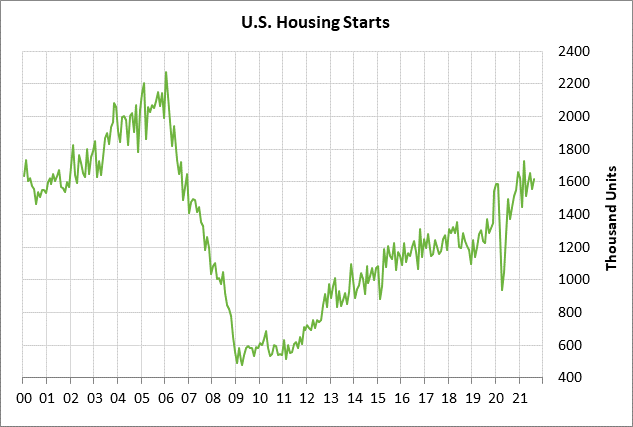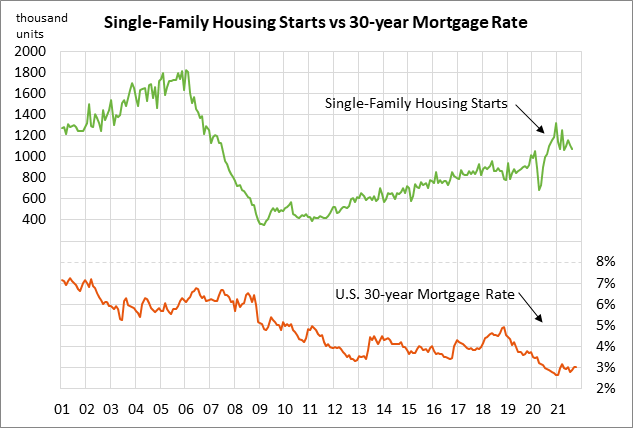- U.S. inflation expectations reach a new 5-1/4 month high and push T-note yields higher
- Manchin says he doesn’t see how the reconciliation bill can be finished by Oct 31
- U.S. housing starts expected to remain strong
U.S. inflation expectations reach a new 5-1/4 month high and push T-note yields higher — The 10-year breakeven inflation expectations rate yesterday edged to a new 5-1/4 month high of 2.57%, but then fell back to close the day mildly lower by -1.5 bp at 2.55%. The breakeven rate yesterday closed just 4 bp below the 8-1/2 year high of 2.59% posted earlier this year in May.
The sharp rise in inflation expectations is putting upward pressure on Treasury yields and downward pressure on stock prices. The 10-year T-note yield yesterday rose by +3 bp to 1.60%, and is just 3 bp below last week’s 4-1/2 month high of 1.63%.
Inflation expectations have risen sharply by about 25 bp in the past month due to the surge in crude oil and natural gas prices, and industrial metals prices. Inflation expectations have also been pushed higher by (1) the host of supply-chain disruptions, (2) labor shortages that are pushing wages higher, and (3) higher shipping prices.
The ISM manufacturing prices-paid sub-index remained very high at 81.2 in September, illustrating that manufacturers are still seeing extremely high input prices. The manufacturing prices-paid sub-index is down from the 42-year high of 92.1 posted in June, but is still at alarmingly high levels. The non-manufacturing price index in August was high at 75.4, illustrating that the non-manufacturing sectors of the U.S. economy are also seeing high prices.
The sharp rise in crude oil prices seen since September has been a key factor driving inflation expectations higher. Nov WTI crude oil futures prices on Monday rose to a new 7-year high of $83.37. Nearest-future WTI crude oil prices have soared by +22% from the 68.59 level seen on Sep 1.
Crude oil prices have been driven higher mainly by the fact that OPEC+ has been starving the market of supply. OPEC+ has been boosting production, but not by enough to keep up with increased demand. OPEC+ production discipline may eventually break down into chaos once again, but in the meantime, the world crude oil market is facing a deficit and prices are moving higher.
Inflation expectations have also been pushed higher by the upward spike in natural gas prices seen in September and early October. Natural gas prices have fallen sharply in the past two weeks on forecasts for warm weather and long liquidation pressure. However, natural gas prices remain high and are boosting costs for utilities, businesses, and consumers.
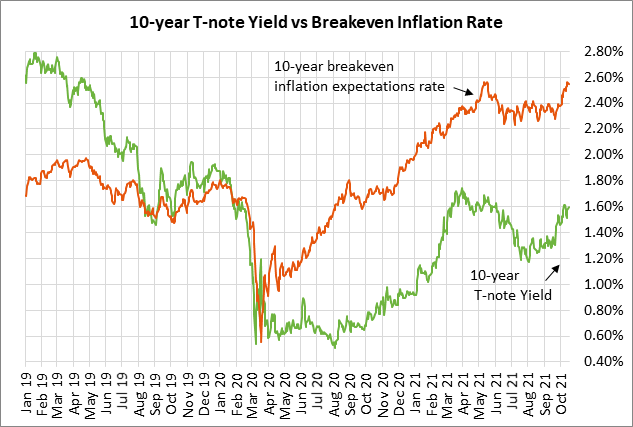
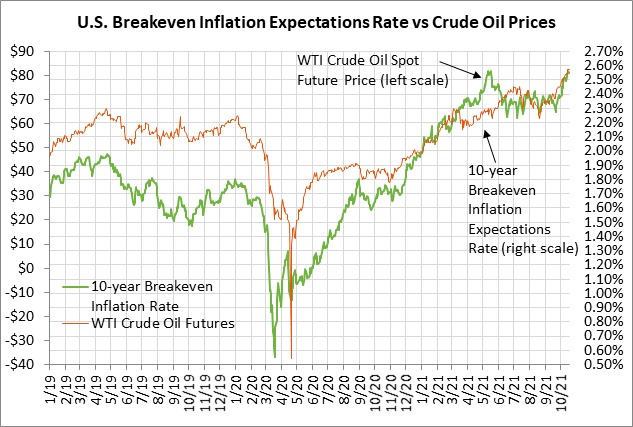
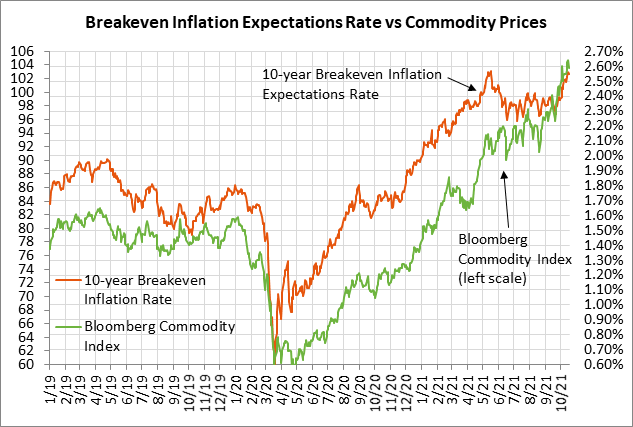
Manchin says he doesn’t see how the reconciliation bill can be finished by Oct 31 — Commenting on the reconciliation bill, Democratic Senator Manchin yesterday said, “There is an awful lot to go, I don’t know how that would happen” by October 31. He added, “Once you come to a meeting of the minds, you might be able to work something out.”
House Speaker Pelosi has set a deadline of October 31 for getting the reconciliation bill and $550 billion infrastructure bill passed. That deadline coincides with the expiration of some highway funding programs.
Mr. Manchin wants to cut the $3.5 trillion reconciliation bill down to $1.5 trillion. Ms. Pelosi is working on cutting the bill to $2.0 trillion, hoping that Mr. Manchin will go along with a bill of that size in the Senate. Democratic Senator Sinema has given little indication of her demands for the reconciliation bill, with the markets suspecting (for the lack of any better information) that she might go along with Senator Manchin’s final demands.
Congress yesterday returned from recess and began working on the infrastructure and reconciliation bills again. President Biden is meeting with the polarized Democratic factions and is trying to broker a compromise.
There was some talk yesterday between the extremes of the party with Senator Manchin meeting separately with both Congressional Progressive Caucus Chairwoman Pramila Jayapal and progressive Democratic Senator Bernie Sanders.
The stock market would like to see the infrastructure and reconciliation bills passed from the standpoint that a fresh round of fiscal stimulus would be supportive for the economy and corporate profits. However, the stock market is clearly not happy about the increase in the corporate tax rate that is contained in the reconciliation bill since higher corporate taxes would take a direct bite out of after-tax corporate earnings, and therefore out of stock prices.
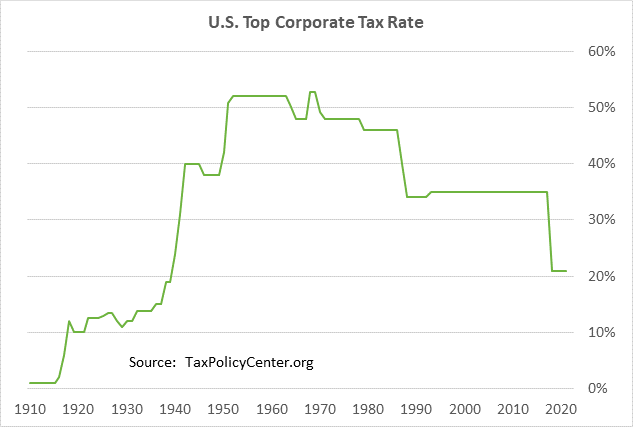
U.S. housing starts expected to remain strong — The consensus is for today’s Sep housing starts report to be unchanged at 1.615 million, following August’s report of +3.9% m/m to 1.615 million. Housing starts have fallen by -6.4%% from March’s 15-year high of 1.725 million. However, housing starts remain in strong shape, and are still above pre-pandemic levels.
U.S. home builders remain very confident about the prospects for the industry. Yesterday’s National Association of Home Builder’s index rose by +4 points to 80, which was above pre-pandemic level of 75.
U.S. home builders remain confident about the future due to the continued strong demand for new homes and the continued low level of mortgage rates. The 30-year mortgage rate has risen to a 6-month high of 3.05%, but that is still well below the pre-pandemic level of 3.75% seen at the end of 2019.
